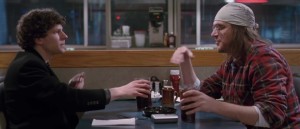I was very moved by the film “The End of the Tour,” which offers a profound glimpse of DAVID FOSTER WALLACE, one of the more talented and compelling writers of our time, as he struggles with the process of being followed and interviewed for a Rolling Stone profile — his aversion to it and his growing public recognition, the issues of depiction in the popular magazine genre, and his grudging acceptance of the purpose of it. It’s also a depiction of the brief but potent relationship with the profile’s writer, as a result.
While the film is definitely very good, it is also only a “glimpse,” because — though we get a deep look at the man’s preoccupations with self and American culture outside his fiction — we don’t get a truly enriching moment in the glow of his literature itself.
Still, the performances are revealing and gripping, and movie is restrained in the best way — investing small moments with the defining gravity they contained for these very sympathetic characters (to me, anyway).
When I lived in Seattle as a young man and worked as a journalist, I remember the excitement around his appearance at Elliot Bay Book Company, where I attended some wonderful readings in their basement lit-room. I had not read DFW prior to that event, but I arrived early to have soup and salad in their downstairs cafe (you need soup in a rainy city basement cafe with old wood creaking but comfortable, and the damp scent of books)
At the reading I was riveted at the work, and his manner — he was both totally appropriate to be this figure who had just written a 1000 page, undeniably exciting novel, and someone who seemed to want to flee every other minute when he wasn’t reading.
During the Q&A someone did in fact ask the groaner “How do you get your ideas?” and I laughed when, in the movie, it shows him asking the host of the Minneapolis reading to skip the Q&A so that he doesn’t get asked that very question (!)
Among other things, I loved him for his rejection of the creeping overuse of irony in American culture was both prescient and heartfelt — he knew it was a necessary result and tool of our postmodern age, but labored to reveal the heart’s unashamed struggle for something more connective and transcendent, as irony can too easily become a form of loneliness, no matter how it can be shared in in-group settings.
The movie struck me for showing that he was an extraordinary artist, writer, teacher and thinker who needed to maintain his pre-fame existence as, and attire of, an ordinary man in order to make that very art. The humor, banter and pathos of that conundrum is beautifully expressed in the film.
This is a link to his wonderful, humorous, even chill-inducing commencement speech at Kenyon College, ten years ago. This is the transcript of it as it was spoken, which I recommend over the “adapted for essay” version later published.
– Daniel Housman is a screenwriter living in Los Angeles.



